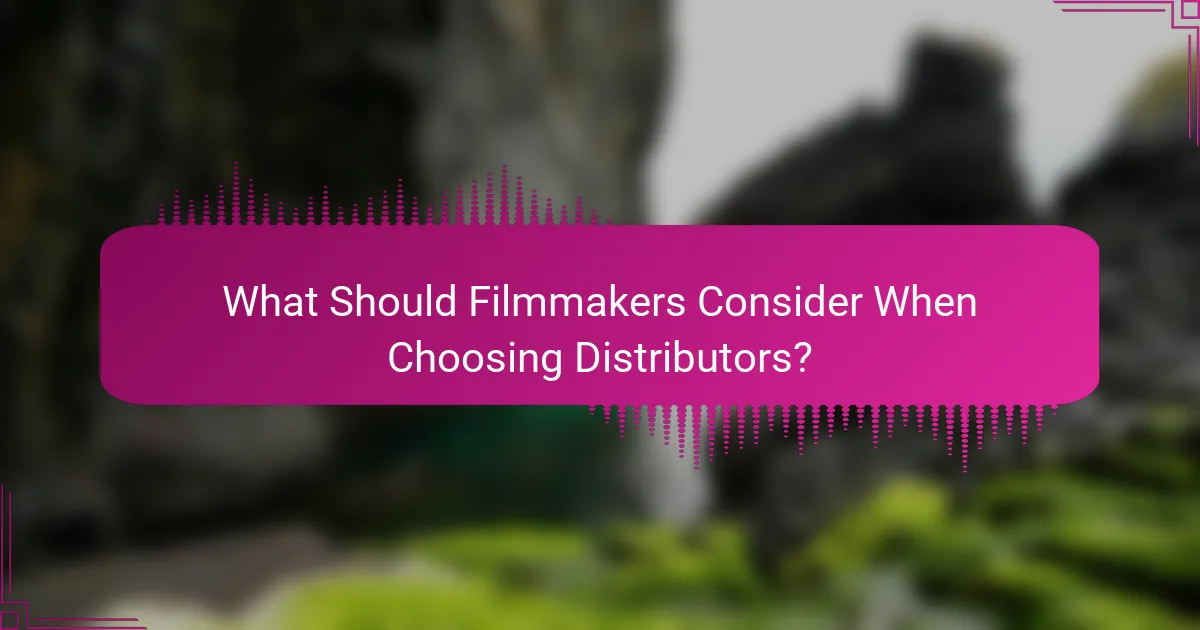Building relationships with distributors at indie film festivals is crucial for filmmakers seeking to enhance their film’s visibility and secure distribution opportunities. By engaging in strategic networking and personalized outreach, filmmakers can forge genuine connections that may lead to valuable partnerships. Key festivals serve as essential platforms for showcasing films and navigating the competitive landscape of the industry.

How to Build Relationships with Distributors at Indie Film Festivals?
Building relationships with distributors at indie film festivals involves strategic networking, personalized outreach, and effective follow-up. Establishing genuine connections can lead to valuable partnerships and distribution opportunities for your film.
Networking events and panels
Networking events and panels at indie film festivals provide excellent opportunities to meet distributors face-to-face. Attend sessions that focus on distribution trends, as these often attract industry professionals eager to connect with filmmakers.
Engage actively during Q&A sessions and discussions. Prepare thoughtful questions that demonstrate your knowledge and interest in the distribution process, which can help you stand out to potential partners.
Personalized outreach strategies
After identifying potential distributors, craft personalized outreach messages that reflect your understanding of their catalog and interests. Mention specific films they have distributed that align with your project to create a connection.
Keep your outreach concise and focused. Highlight what makes your film unique and how it fits into their distribution strategy, making it easier for them to see the value in your project.
Leveraging social media platforms
Social media platforms like LinkedIn and Twitter are powerful tools for connecting with distributors. Follow industry professionals and engage with their content to build rapport before reaching out directly.
Share updates about your film and festival experiences on these platforms. Use relevant hashtags to increase visibility and attract the attention of distributors who are monitoring trends in the indie film scene.
Follow-up communication techniques
After initial meetings or outreach, timely follow-up is crucial. Send a thank-you email within a few days, reiterating your interest in collaborating and referencing specific points from your conversation.
Maintain a professional tone and provide any additional information they may have requested. If you don’t hear back, consider a gentle follow-up after a week or two to keep the conversation alive without being overly persistent.

What Are the Key Indie Film Festivals for Distributors?
Distributors should focus on several key indie film festivals that serve as vital platforms for showcasing films and building industry relationships. These festivals provide opportunities for networking, acquiring distribution rights, and gaining visibility in the competitive film market.
Sundance Film Festival
The Sundance Film Festival, held annually in Park City, Utah, is one of the most prestigious platforms for independent filmmakers and distributors. It typically features a diverse range of films, attracting a large audience of industry professionals, critics, and film enthusiasts.
Distributors attending Sundance should prioritize networking events and screenings to connect with filmmakers and other industry players. It’s essential to have a clear strategy for which films to target based on audience reception and potential marketability.
Toronto International Film Festival
The Toronto International Film Festival (TIFF) is a major event in the film industry, taking place in September each year. TIFF is known for its strong focus on international cinema and serves as a launchpad for films seeking distribution in North America.
Distributors should consider TIFF as a critical opportunity to gauge audience reactions and secure rights for films that resonate well. Engaging in discussions with filmmakers and attending panel sessions can provide valuable insights into emerging trends and audience preferences.
Cannes Film Festival
The Cannes Film Festival, held in France, is renowned for its glamorous setting and high-profile premieres. This festival attracts a global audience and is a key event for distributors looking to acquire films with international appeal.
Distributors should prepare for intense competition at Cannes, as many films vie for attention. Establishing relationships with sales agents and attending networking events can enhance the chances of securing promising titles. It’s crucial to have a well-defined acquisition strategy that aligns with the festival’s prestigious atmosphere.

What Should Filmmakers Consider When Choosing Distributors?
Filmmakers should evaluate several key factors when selecting a distributor, including the distribution model, market reach, and the distributor’s track record of success. These considerations can significantly impact the film’s visibility and financial returns.
Distribution model options
There are various distribution models filmmakers can choose from, including theatrical, digital, and hybrid approaches. The theatrical model focuses on cinema releases, while digital distribution encompasses platforms like streaming services and video-on-demand.
Filmmakers should weigh the pros and cons of each model. For instance, theatrical releases may offer higher revenue potential but require significant marketing investment, whereas digital distribution can provide broader access with lower upfront costs.
Distributor’s market reach
A distributor’s market reach is crucial for maximizing a film’s audience. Filmmakers should assess how well the distributor can connect with target demographics across different regions and platforms. A distributor with established relationships in international markets can open doors to lucrative opportunities.
Consider the distributor’s existing partnerships with streaming platforms, television networks, and film festivals. A strong network can enhance visibility and drive sales, particularly in competitive markets.
Previous success stories
Investigating a distributor’s previous success stories can provide insights into their effectiveness. Filmmakers should look for case studies or testimonials from other filmmakers who have worked with the distributor.
Success can be measured in various ways, such as box office performance, awards won, or audience engagement. A distributor with a solid track record of helping films achieve their goals is likely to be a better choice.

How to Prepare for Meetings with Distributors?
Preparing for meetings with distributors involves understanding their expectations and presenting your film effectively. Focus on crafting a strong pitch, knowing what distributors seek, and having the right materials ready to make a lasting impression.
Creating a compelling pitch
A compelling pitch is concise and engaging, typically lasting around 10 minutes. Start with a strong logline that captures the essence of your film, followed by key themes and unique selling points that differentiate your project.
Practice your delivery to ensure confidence and clarity. Tailor your pitch to the distributor’s specific interests, showcasing how your film aligns with their catalog and audience preferences.
Understanding distributor needs
Distributors often look for films that fit their target market and have potential for profitability. Research the distributor’s previous acquisitions to identify patterns in their preferences, such as genre, budget range, and audience demographics.
Engage in conversations to uncover their current needs and challenges. This insight allows you to position your film as a solution, highlighting its marketability and potential for success in their distribution strategy.
Gathering relevant materials
Before the meeting, compile essential materials that support your pitch. This includes a well-designed one-sheet, a trailer or sizzle reel, and any press coverage or awards your film has received. Aim for a professional presentation that reflects the quality of your project.
Consider creating a digital press kit that can be easily shared. Ensure all materials are up-to-date and tailored to the distributor’s requirements, as this demonstrates professionalism and preparedness.

What Are the Benefits of Collaborating with Distributors?
Collaborating with distributors offers indie filmmakers enhanced visibility and access to broader audiences. By leveraging their networks and expertise, filmmakers can effectively navigate the complex landscape of film distribution.
Increased market access
Distributors provide indie films with access to various markets that might otherwise be difficult to penetrate. They have established relationships with theaters, streaming platforms, and international markets, allowing films to reach diverse audiences.
For example, a distributor may help an indie film secure screenings at film festivals or negotiate deals with international distributors, significantly expanding its reach. This access can lead to increased ticket sales and potential revenue streams.
Expertise in film promotion
Distributors possess specialized knowledge in marketing and promoting films effectively. They understand audience targeting, promotional strategies, and the nuances of different platforms, which can enhance a film’s visibility.
By collaborating with a distributor, filmmakers can benefit from tailored marketing campaigns that resonate with specific demographics, increasing the likelihood of success. This expertise can include social media marketing, press outreach, and festival promotion.
Streamlined distribution process
The distribution process can be complex, involving legal agreements, logistics, and compliance with various regulations. Distributors simplify this process by managing these aspects, allowing filmmakers to focus on their creative work.
For instance, a distributor will handle the technical requirements for film formats, negotiate contracts, and ensure timely delivery to platforms or theaters. This efficiency can save filmmakers time and reduce the risk of costly mistakes.
